Related Research Articles
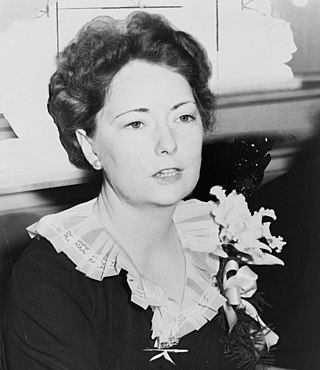
Margaret Munnerlyn Mitchell was an American novelist and journalist. Mitchell wrote only one novel, published during her lifetime, the American Civil War-era novel Gone with the Wind, for which she won the National Book Award for Most Distinguished Novel of 1936 and the Pulitzer Prize for Fiction in 1937. Long after her death, a collection of Mitchell's girlhood writings and a novella she wrote as a teenager, titled Lost Laysen, were published. A collection of newspaper articles written by Mitchell for The Atlanta Journal was republished in book form.

Athens, officially Athens–Clarke County, is a consolidated city-county and college town in the U.S. state of Georgia. Athens lies about 70 miles northeast of downtown Atlanta, and is a satellite city of the capital. The University of Georgia, the state's flagship public university and an R1 research institution, is in Athens and contributed to its initial growth. In 1991, after a vote the preceding year, the original City of Athens abandoned its charter to form a unified government with Clarke County, referred to jointly as Athens–Clarke County.

Rebecca Ann Felton was an American writer, lecturer, feminist, suffragist, reformer, slave owner, and politician who was the first woman to serve in the United States Senate, although she served for only one day.

George Dekle Busbee Sr., was an American politician who served as the 77th Governor of the State of Georgia from 1975 to 1983, and a senior partner at King & Spalding thereafter.

Leah Ward Sears is an American jurist and former Chief Justice of the Supreme Court of Georgia. Sears was the first African-American female chief justice of a state supreme court in the United States. When she was first appointed as justice in 1992 by Governor Zell Miller, she became the first woman and youngest person to sit on Georgia's Supreme Court.
Piedmont University is a private university in Demorest and Athens, Georgia. Founded in 1897, Piedmont's Demorest campus includes 300 acres in a traditional residential-college setting located in the foothills of the northeast Georgia Blue Ridge mountains. Total enrollment is approximately 2,571 students and the campus includes ten dormitories housing more than 720 students.

Corra Mae Harris, was an American writer and journalist. She was one of the first women war correspondents to go abroad in World War I.

Lugenia Burns Hope, was a social reformer whose Neighborhood Union and other community service organizations improved the quality of life for African Americans in Atlanta, Georgia, and served as a model for the future Civil Rights Movement.

Rebecca Solnit is an American writer. She has written on a variety of subjects, including feminism, the environment, politics, place, and art.

Willie Christine King Farris is the eldest sibling of Martin Luther King Jr. She taught at Spelman College and is the author of several books and was a public speaker on various topics, including the King family, multicultural education, and teaching.

Adrienne Elizabeth McNeil Herndon was an actress, professor, and activist in Atlanta, Georgia. While admittedly an African American to friends and colleagues, she performed with the stage name Anne Du Bignon. She was one of the first African American faculty at Atlanta University, where she met W. E. B. Du Bois and subsequently worked with him. Herndon and Alonzo Herndon were an influential couple.
Gena Knox is an American food writer, cookbook author, and entrepreneur. Her first cookbook, Gourmet Made Simple, was released in May 2008. She is also the founder and CEO of Fire & Flavor, a company specializing in grilling planks and at-home cooking products. Knox's third book, Southern My Way: Food & Family, was released in 2013.
Prathia Laura Ann Hall Wynn was an American leader and activist in the Civil Rights Movement, a womanist theologian, and ethicist. She was the key inspiration for Martin Luther King Jr.'s "I Have a Dream" speech.
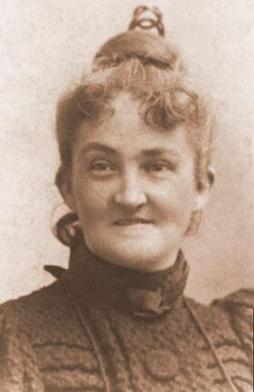
Mildred Lewis "Miss Millie" Rutherford was a prominent white supremacist educator and author from Athens, Georgia. She served the Lucy Cobb Institute, as its head and in other capacities, for over forty years, and oversaw the addition of the Seney-Stovall Chapel to the school. Heavily involved in many organizations, she became the historian general of the United Daughters of the Confederacy (UDC), and a speech given for the UDC was the first by a woman to be recorded in the Congressional Record. She was a prolific non-fiction writer. Also known for her oratory, Rutherford was distinctive in dressing as a southern belle for her speeches. She held strong pro-Confederacy, proslavery views and opposed women's suffrage.

The Henry Grady Hotel was a hotel in downtown Atlanta, Georgia, United States. The building, designed by architect G. Lloyd Preacher, was completed in 1924 at the intersection of Peachtree Street and Cain Street, on land owned by the government of Georgia that had previously been occupied by the official residence of the governor. The hotel, which was named after journalist Henry W. Grady, was owned by the state and leased to operators. During the mid-1900s, the hotel typically served as the residence of state legislators during the legislative sessions, and it was an important location for politicking, with President Jimmy Carter later saying, "[m]ore of the state's business was probably conducted in the Henry Grady than in the state capitol". In the late 1960s, the government decided to not renew the building's lease when it expired in 1972, and it was demolished that year. The land was sold to developers and the Peachtree Plaza Hotel was built on the site. At the time of its completion in 1976, it was the tallest hotel building in the world.
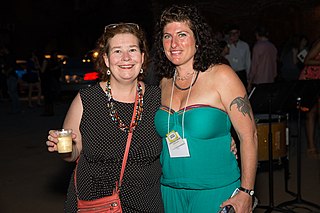
Corrina Sephora Mensoff is a visual artist who specializes in metal work, sculpture, painting, installation, and mixed media in Atlanta, Georgia, in the United States. Corrina works with universal and personal themes of loss and transformation, within the context of contemporary society. In Corrina’s most recent bodies of work she is exploring lunar images, cells, and the universe as “a meditation in the making.” In a concurrent body of work she has delved into the physical transformation of guns, altering their molecular structure into flowers and garden tools through hot forging the materials. Her work has led her to community involvement with the conversation of guns in our society.
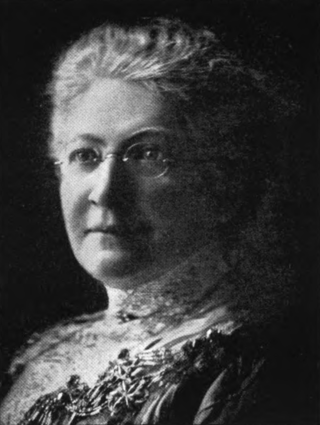
Mary Ellen "Nellie" Peters Black (1851–1919) was a prominent organizer and activist related to women's issues in Georgia. Black also promoted agricultural reform and increasing educational opportunities, especially for women. She was an active member of the Atlanta Woman's Club as well as the Woman's Auxiliary of the Episcopal Diocese of Georgia.
Verda M. Colvin is an associate justice of the Supreme Court of Georgia and former judge of the Georgia Court of Appeals.
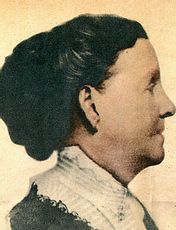
Sarah Harper "Sallie" Heard was an American educator, activist, librarian, and gardener. Well-educated and interested in many topics, Heard was described by an acquaintance as "one of those magnificent Victorian women who had a super-charged energy, which home life could never use up".
The Ministers' Manifesto refers to a series of manifestos written and endorsed by religious leaders in Atlanta, Georgia, United States, during the 1950s. The first manifesto was published in 1957 and was followed by another the following year. The manifestos were published during the civil rights movement amidst a national process of school integration that had begun several years earlier. Many white conservative politicians in the Southern United States embraced a policy of massive resistance to maintain school segregation. However, the 80 clergy members that signed the manifesto, which was published in Atlanta's newspapers on November 3, 1957, offered several key tenets that they said should guide any debate on school integration, including a commitment to keeping public schools open, communication between both white and African American leaders, and obedience to the law. In October 1958, following the Hebrew Benevolent Congregation Temple bombing in Atlanta, 311 clergy members signed another manifesto that reiterated the points made in the previous manifesto and called on the governor of Georgia to create a citizens' commission to help with the eventual school integration process in Atlanta. In August 1961, the city initiated the integration of its public schools.
References
- ↑ Rebecca Burns Decatur Book Festival
- 1 2 3 Rebecca Burns Atlanta Magazine
- ↑ Bio Rebecca Burns website